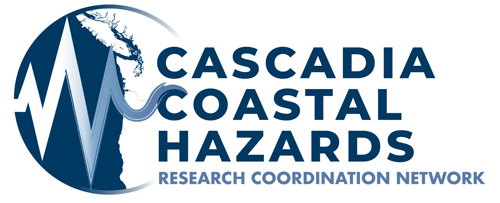About
Interested in learning more about the Cascadia Coastal Hazards Research Coordination Network?
Add yourself to the RCN listserv to stay informed of upcoming events. Browse the list of topics below for more information.
Who can participate?
We welcome participation from anyone interested in the impacts of geohazards in the Pacific Northwest.
What is the target audience?
The primary audience includes academic researchers, state and federal officials, hazard practitioners, and community planners. The disciplinary expertise of RCN participants includes geoscience, ecology, engineering, public health, social science and behavioral science.
Why do we need a research coordination network on the topic of geohazards?
Washington State has the 4th largest number of disaster declarations among US states, according to FEMA. Despite the prevalence of notable hazards research expertise in the PNW, greater coordination of hazards research is needed. Communication and knowledge exchange is often hampered between these different groups, partly because they do not fully understand each other’s needs, practices, and constraints. Equally important, it can be difficult for academic researchers in this region to coordinate on problem-solving, and to find funding for research on local coastal issues. The RCN addresses this need, to tackle fundamental questions on the mechanisms and consequences of interacting natural hazards, and to advance interdisciplinary simulation and modeling of coastal hazards, human-centered design and use-focused representations of modeling and simulation results, and integration of natural and engineering sciences with research on policy and planning. Greater collaboration and improved partnerships between both local and academic stakeholders promise to help prevent the most disastrous outcomes of such events, by improving preparedness and response.
What geohazards and other topics are of interest to the RCN?
We are considering any natural hazard or cascading event that poses significant risks to coastal residents and to the regional economy. Such natural events may include earthquakes, tsunamis, landslides, wildfires, windstorms, freshwater and storm surge flooding, and mudslides. The RCN will focus on three overarching themes: (1) Integrating health into coastal hazards research, (2) Geoscience and cascading hazards, and (3) Hazard engineering, planning, and policy.
Who is leading this RCN?
The funding for the RCN is administered through the University of Washington. However, the participants and leadership represent a wide range of regional organizations, including academic institutions, federal and state agencies, and civic organizations. See the [Leadership] page for a full list of those serving on the various committees.
What type of events are offered?
The RCN holds regular seminars through the year, which are typically streamed online. Additionally, there is a community workshop held each year. See the Events page for a full list of future and past events.
How do I contact the RCN leadership to ask a question or provide feedback?
Send an email to cascadia_rcn@uw.edu, and someone will reach out to you.
How can I receive announcements of RCN activities?
Add yourself to the RCN email list by sending this email.
How do I unsubscribe from the RCN email list?
Remove yourself from the RCN email list by sending this email.

